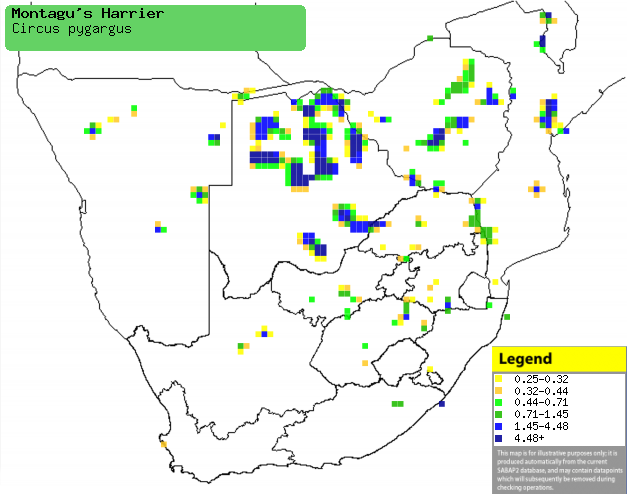|
Circus pygargus (Montagu's
harrier)
Bloupaddavreter [Afrikaans]; Blouvleivalk [Afrikaans];
Grauwe kiekendief [Dutch]; Busard cendré [French]; Wiesenweihe [German];
Tartaranhão-caçador [Portuguese]
Life
> Eukaryotes >
Opisthokonta
> Metazoa (animals) >
Bilateria >
Deuterostomia > Chordata >
Craniata > Vertebrata (vertebrates) > Gnathostomata (jawed
vertebrates) > Teleostomi (teleost fish) > Osteichthyes (bony fish) > Class:
Sarcopterygii (lobe-finned
fish) > Stegocephalia (terrestrial
vertebrates) > Tetrapoda
(four-legged vertebrates) > Reptiliomorpha > Amniota >
Reptilia (reptiles) >
Romeriida > Diapsida > Archosauromorpha > Archosauria >
Dinosauria
(dinosaurs) > Saurischia > Theropoda (bipedal predatory dinosaurs) >
Coelurosauria > Maniraptora > Aves
(birds) > Order: Falconiformes
> Family: Accipitridae
> Genus: Circus
Distribution and habitat
Breeds from north-west Africa to Spain and Mongolia,
heading south in the non-breeding season to sub-Saharan Africa. In southern
Africa, it is uncommon in isolated patches of Zimbabwe, central and
southern Mozambique, Botswana, Namibia and South Africa, favouring grassland
with open pans or flood plains.
|
 |
|
Distribution of Montagu's harrier in southern Africa,
based on statistical smoothing of the records from first SA Bird Atlas
Project (©
Animal Demography unit, University of
Cape Town; smoothing by Birgit Erni and Francesca Little). Colours range
from dark blue (most common) through to yellow (least common).
See here for the latest distribution
from the SABAP2. |
Movements and migrations
Palearctic breeding migrant, arriving in
southern Africa in October and departing by April; numbers generally
peak in the region from December-January.
Food
It mainly eats insects, such as locusts (Orthoptera)
and
termites, doing most of its foraging on windy days. It flies in a similar
manner to terns, catching the majority of its prey on the ground.
Threats
Not threatened.
References
-
Hockey PAR, Dean WRJ and Ryan PG 2005. Roberts
- Birds of southern Africa, VIIth ed. The Trustees of the John Voelcker
Bird Book Fund, Cape Town.
|
